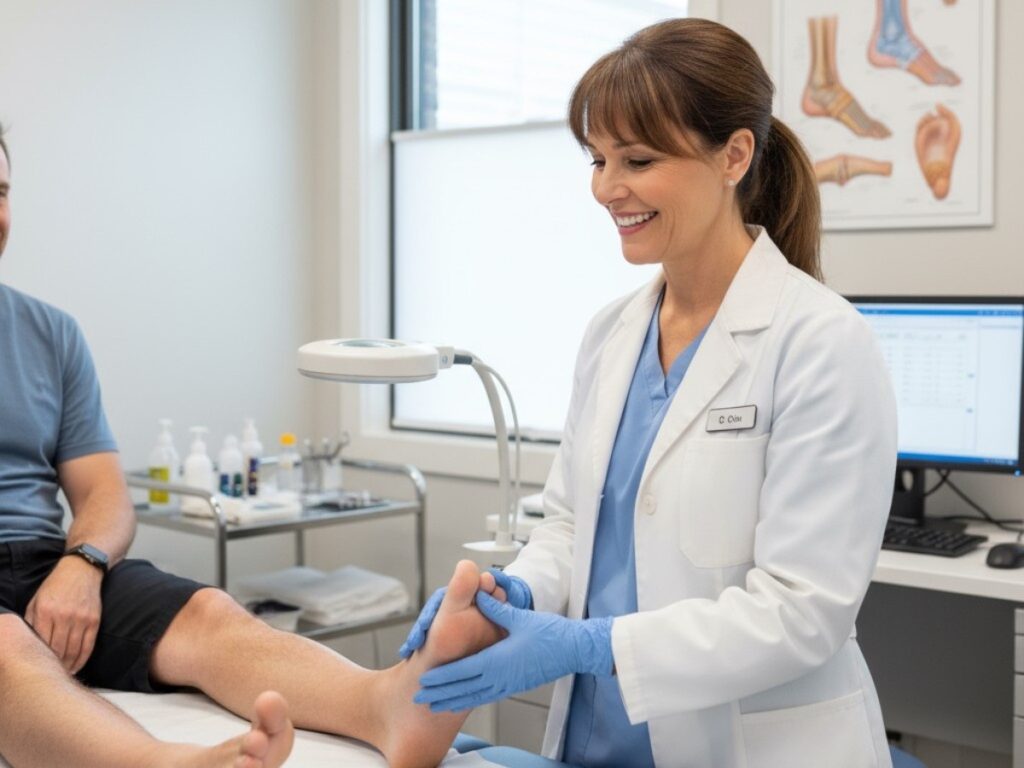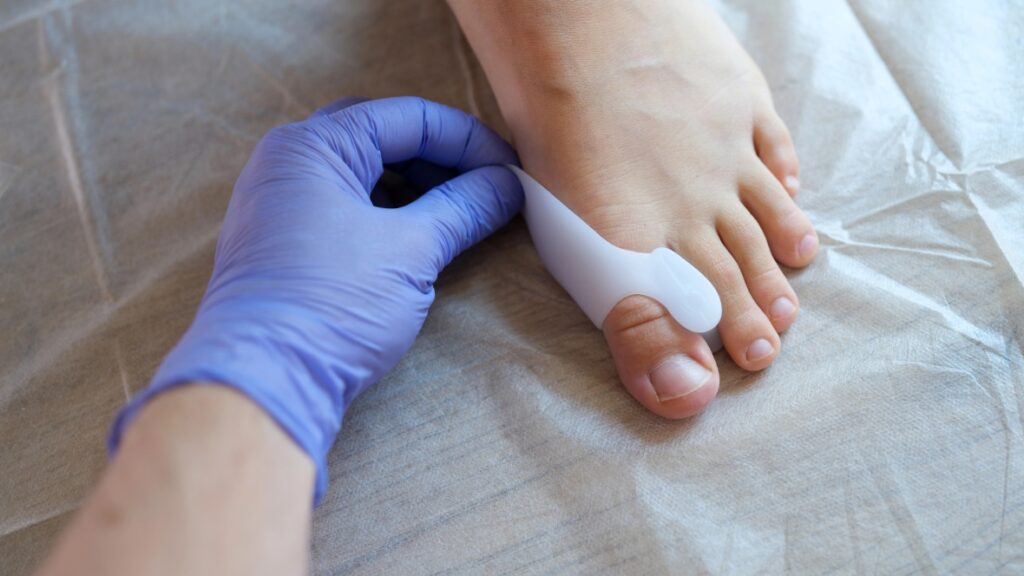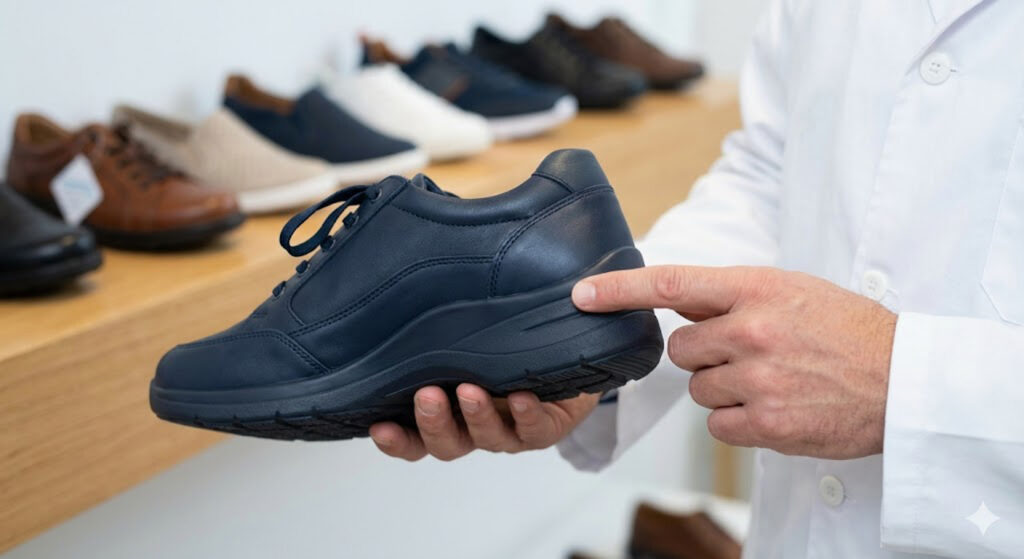Let’s be honest: most people only start thinking about their feet when something hurts. Yet our feet are the quiet workhorses of the body. They absorb shock, maintain balance, and carry us thousands of steps a day. Ignoring them is like ignoring the tires on your car—you may not notice a problem right away, but eventually, it’ll slow you down or leave you stranded.
So, when should you actually see a podiatrist? Let’s dive into the situations, signs, and conditions that make professional foot care not just a good idea—but a necessity.

Understanding the Role of a Podiatrist
What Exactly Does a Podiatrist Treat?
A podiatrist is a healthcare professional who specializes in diagnosing, treating, and preventing foot and ankle issues. Their expertise covers everything from everyday annoyances like athlete’s foot to complex challenges such as reconstructive surgery.
Imagine your feet as the foundation of a house. If the foundation starts to crack or shift, everything above it feels the effect. That’s why podiatrists are so important—they ensure that your “foundation” remains strong and healthy.
They treat:
- Structural problems (bunions, hammertoes, flat feet)
- Skin and nail conditions (fungus, corns, ingrown toenails)
- Sports-related injuries (sprains, fractures, tendonitis)
- Chronic diseases affecting the feet (diabetes, arthritis)
How a Podiatrist Differs from Other Doctors
Your primary care doctor may give you a cream for athlete’s foot or recommend rest for a sprained ankle, but podiatrists dive deeper. They have years of specialized training focusing exclusively on the feet and ankles.
For instance, if you have recurring heel pain, a general physician might suggest painkillers. A podiatrist, on the other hand, will examine your gait, evaluate your shoes, and perhaps design custom orthotics to fix the root cause. They don’t just patch problems—they engineer long-term solutions.
Everyday Foot Problems That Deserve Professional Care
Persistent Heel Pain That Won’t Go Away
Heel pain, particularly in the morning, is often linked to plantar fasciitis. You might notice it when you first step out of bed, like stepping onto a pebble. While stretching and ice packs can help temporarily, recurring pain signals an underlying issue that needs medical attention.
Left untreated, plantar fasciitis can lead to chronic inflammation and limited mobility. A podiatrist can use targeted treatments such as shockwave therapy, night splints, or custom orthotics to relieve the strain.
Ingrown Toenails That Keep Coming Back
An ingrown toenail seems minor until you’ve had one that turns red, swells, or starts draining pus. Many people try to “dig it out” themselves, which often makes the problem worse.
A podiatrist can not only remove the ingrown portion safely but also, in stubborn cases, perform a simple procedure to prevent regrowth in that area. Think of it as fixing the root of a weed instead of just trimming the visible leaves.
Bunions and Hammertoes Progressing in Severity
Bunions (bony bumps at the base of the big toe) and hammertoes (abnormally bent toes) often start small but worsen over time. They make wearing shoes uncomfortable and can even shift your gait, leading to hip and back pain.
Early intervention can include padding, splints, or orthotics. Waiting too long might mean surgery is the only option. So if you notice your shoes feeling tighter around the toe box, it’s time to see a podiatrist.
Signs You Shouldn’t Ignore
Foot Pain That Affects Your Daily Life
We tend to shrug off foot pain, chalking it up to long days or “getting older.” But chronic or recurring pain is not normal. If walking to the mailbox or standing in line at the grocery store hurts, it’s a signal that something is wrong.
Podiatrists can pinpoint whether the pain stems from soft tissue, bone, or joint issues—and then create a plan to bring relief.
Wounds or Sores That Refuse to Heal
This is especially dangerous for diabetics. A small blister can quickly turn into an ulcer, and an untreated ulcer can lead to infection or, in severe cases, amputation.
If you notice a sore that lingers for more than a week, don’t wait. A podiatrist can clean the wound, manage infection, and suggest strategies to promote healing.
Changes in Foot Shape or Appearance
If your arch suddenly collapses or you notice one foot looking noticeably different than the other, it’s more than cosmetic. It could signal tendon tears, arthritis, or neurological conditions.
Think of it like your car alignment going off—ignore it, and other parts start wearing down unevenly.
Swelling, Numbness, or Tingling in Your Feet
These sensations can be linked to circulation problems, nerve damage, or systemic diseases like diabetes. Swelling might also indicate deep vein thrombosis (a blood clot), which is a medical emergency.
Don’t brush off these warning signs. A podiatrist can run diagnostic tests to find the underlying cause.
Foot Problems Linked to Underlying Conditions
Diabetes and the Risk of Foot Complications
Diabetes often damages nerves (neuropathy) and reduces blood flow to the feet, meaning injuries can go unnoticed until they’re serious. That’s why routine podiatry visits are critical for diabetic patients.
A podiatrist can trim nails safely, manage calluses, and provide preventive care to stop small problems from becoming life-threatening.
Arthritis Causing Stiffness and Deformity
Arthritis in the feet doesn’t just cause stiffness—it can deform joints, making simple tasks like walking or standing painful. Podiatrists can recommend bracing, anti-inflammatory treatments, and shoe modifications to reduce discomfort and slow progression.
Sports Injuries and Stress Fractures
Athletes push their feet to the limit. Runners, for example, put up to three times their body weight on each stride. Stress fractures, sprains, and tendonitis are common.
Podiatrists help athletes recover safely and design prevention plans, including tailored footwear and stretching routines.
Preventive Reasons to Visit a Podiatrist
Routine Foot Exams for Long-Term Health
Just as you don’t wait for cavities to visit the dentist, you shouldn’t wait for foot pain to see a podiatrist. Preventive exams can catch issues like flat feet or early bunions before they cause serious problems.
Footwear Advice and Custom Orthotics
Shoe shopping can feel like trial and error. A podiatrist removes the guesswork by analyzing your gait and prescribing orthotics. These inserts are like tailored suits for your feet, providing support and comfort unmatched by off-the-shelf insoles.
Preventing Falls and Maintaining Mobility
Falls are a leading cause of injury among older adults. Poor balance often comes from foot instability. By correcting biomechanical issues, podiatrists help seniors stay steady, mobile, and independent.

Why Delay Can Make Things Worse
Small Issues Growing into Big Problems
That “little” callus? It can crack open, become infected, and lead to weeks of downtime. What starts as a nuisance can spiral into a serious condition.
The Hidden Risks of Self-Treatment
DIY foot care—like bathroom surgery on ingrown nails—often backfires. Infection, scarring, or worsening pain are common outcomes. Professional podiatric care ensures safe and lasting results.
Spotlight on Vital Podiatry Cypress Foot and Ankle Specialist
Serving Patients Near Northwest Lake Business Park
For those living or working near Northwest Lake Business Park, Vital Podiatry Cypress Foot and Ankle Specialist is a trusted destination for comprehensive foot and ankle care. Its convenient location makes it easy for busy professionals and residents alike to prioritize foot health.
Comprehensive Foot and Ankle Care Services
The clinic provides a full range of services, from preventive screenings and diabetic foot care to surgical procedures and orthotic fittings. Whether you’re battling stubborn heel pain or seeking routine check-ups, the team is equipped to help.
Patient-Centered Approach and Modern Techniques
What sets this practice apart is its combination of compassion and innovation. The team listens to patients’ concerns, explains treatment options in plain language, and uses advanced technology to deliver the best outcomes.
How to Prepare for Your First Podiatry Visit
What Information to Bring
To get the most from your appointment, bring a list of your symptoms, current medications, and medical history. If specific shoes cause pain, bring them along too. They may give your podiatrist valuable clues.
Questions to Ask Your Podiatrist
Go prepared with questions like:
- “What’s causing my symptoms?”
- “Do I need custom orthotics or just better shoes?”
- “How can I prevent this from coming back?”
Engaging in dialogue ensures you leave with clarity and confidence in your treatment plan.
Choosing the Right Time to Book an Appointment
Emergency vs. Routine Visits
Severe pain, infections, or sudden injuries should prompt an immediate visit. Routine issues—like mild bunions or callus buildup—still deserve attention but can be scheduled more flexibly.
Annual Foot Check-Ups
If you have diabetes, arthritis, or recurring foot problems, annual check-ups are essential. Even healthy individuals benefit from preventive visits, especially if they’re active or spend long hours on their feet.
Vital Podiatry Cypress Foot and Ankle Specialist Serving the Northwest Lake Business Park Community and Beyond in Cypress
Vital Podiatry Cypress Foot and Ankle Specialist is dedicated to serving the diverse needs of the local community of Cypress, including individuals residing in neighborhoods like Northwest Lake Business Park. With its convenient location near landmarks such as the Messiah Lutheran Church and major intersections like Matzke Rd and Cypress North Houston Rd (coordinates: 29.94385349106697, -95.65510971150101), we offer podiatrist Cypress services.
Get Podiatrist Services at Northwest Lake Business Park Now
Navigate From Northwest Lake Business Park to Vital Podiatry Cypress Foot and Ankle Specialist Now
Conclusion
Your feet aren’t just an afterthought—they’re the very foundation of your mobility and independence. Ignoring foot pain or changes can lead to bigger, more complicated issues down the road.
If you’re in or near Northwest Lake Business Park, don’t wait until discomfort sidelines you. Reach out to Vital Podiatry Cypress Foot and Ankle Specialist for expert care that keeps you moving confidently, pain-free, and strong.
FAQs
1. How often should I see a podiatrist if I have diabetes?
At least once a year for preventive care. If you develop sores, infections, or numbness, more frequent visits are necessary.
2. Can a podiatrist perform surgery?
Yes. Podiatrists are trained in both minor and advanced surgical procedures involving the foot and ankle.
3. Is foot pain ever considered “normal”?
No. Persistent or recurring pain signals an underlying issue. Pain-free feet should always be the goal.
4. Do podiatrists only treat serious conditions?
Not at all. We also treat everyday problems like corns, athlete’s foot, and shoe-related discomfort.
5. Can podiatry care really prevent falls in seniors?
Absolutely. By correcting foot mechanics and recommending supportive footwear, podiatrists reduce fall risks significantly.










